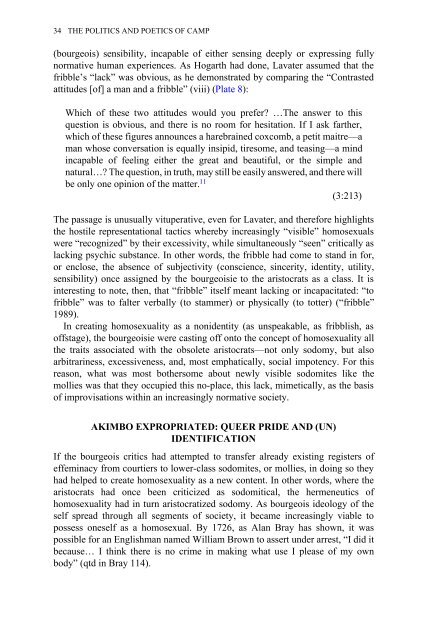Edited by Moe Meyer - Get a Free Blog
Edited by Moe Meyer - Get a Free Blog
Edited by Moe Meyer - Get a Free Blog
Create successful ePaper yourself
Turn your PDF publications into a flip-book with our unique Google optimized e-Paper software.
34 THE POLITICS AND POETICS OF CAMP<br />
(bourgeois) sensibility, incapable of either sensing deeply or expressing fully<br />
normative human experiences. As Hogarth had done, Lavater assumed that the<br />
fribble’s “lack” was obvious, as he demonstrated <strong>by</strong> comparing the “Contrasted<br />
attitudes [of] a man and a fribble” (viii) (Plate 8):<br />
Which of these two attitudes would you prefer? …The answer to this<br />
question is obvious, and there is no room for hesitation. If I ask farther,<br />
which of these figures announces a harebrained coxcomb, a petit maitre—a<br />
man whose conversation is equally insipid, tiresome, and teasing—a mind<br />
incapable of feeling either the great and beautiful, or the simple and<br />
natural…? The question, in truth, may still be easily answered, and there will<br />
be only one opinion of the matter. 11<br />
(3:213)<br />
The passage is unusually vituperative, even for Lavater, and therefore highlights<br />
the hostile representational tactics where<strong>by</strong> increasingly “visible” homosexuals<br />
were “recognized” <strong>by</strong> their excessivity, while simultaneously “seen” critically as<br />
lacking psychic substance. In other words, the fribble had come to stand in for,<br />
or enclose, the absence of subjectivity (conscience, sincerity, identity, utility,<br />
sensibility) once assigned <strong>by</strong> the bourgeoisie to the aristocrats as a class. It is<br />
interesting to note, then, that “fribble” itself meant lacking or incapacitated: “to<br />
fribble” was to falter verbally (to stammer) or physically (to totter) (“fribble”<br />
1989).<br />
In creating homosexuality as a nonidentity (as unspeakable, as fribblish, as<br />
offstage), the bourgeoisie were casting off onto the concept of homosexuality all<br />
the traits associated with the obsolete aristocrats—not only sodomy, but also<br />
arbitrariness, excessiveness, and, most emphatically, social impotency. For this<br />
reason, what was most bothersome about newly visible sodomites like the<br />
mollies was that they occupied this no-place, this lack, mimetically, as the basis<br />
of improvisations within an increasingly normative society.<br />
AKIMBO EXPROPRIATED: QUEER PRIDE AND (UN)<br />
IDENTIFICATION<br />
If the bourgeois critics had attempted to transfer already existing registers of<br />
effeminacy from courtiers to lower-class sodomites, or mollies, in doing so they<br />
had helped to create homosexuality as a new content. In other words, where the<br />
aristocrats had once been criticized as sodomitical, the hermeneutics of<br />
homosexuality had in turn aristocratized sodomy. As bourgeois ideology of the<br />
self spread through all segments of society, it became increasingly viable to<br />
possess oneself as a homosexual. By 1726, as Alan Bray has shown, it was<br />
possible for an Englishman named William Brown to assert under arrest, “I did it<br />
because… I think there is no crime in making what use I please of my own<br />
body” (qtd in Bray 114).


